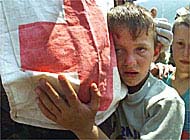
Kosovo uranium risks assessed in Switzerland

Claims that at least 12 NATO soldiers have died as a result of contact with depleted uranium in Kosovo have prompted the Swiss army and humanitarian groups to reassess the danger of this kind of ammunition.
Swiss military experts insist that the risks posed to members of the 150-strong Swiss contingent in the province are minimal.
An army spokesman said tests carried out at its laboratory in Spiez last July showed an almost total absence of danger, unless people were in close proximity to depleted uranium debris for a long period of time. The Swiss were not close to sites where the bombs were used.
Nevertheless, the General Staff’s conduct committee made clear it would be re-examining the question of the risks posed to the Swiss battalion.
Six Italian soldiers who served in the Balkans have now died – all of them from leukaemia. The most recent soldier to die had not served in Kosovo but had done two tours of duty in Bosnia-Herzegovina.
Five Belgian soldiers and one Portuguese peacekeeper have also died as a possible result of uranium contamination.
The Italian government has called on NATO to investigate a possible link to ammunition containing depleted uranium used by US warplanes during the Bosnian and Kosovo conflicts. The dense metal is used because of its ability to pierce armour.
News that Kosovo veterans have been dying in suspiciously high numbers has also raised questions about the safety of humanitarian workers who were in the province soon after the NATO bombing campaign.
The International Committee of the Red Cross told swissinfo that last year, after it discovered that depleted uranium was being used in the conflict, it tested a sample of around 30 of its staff, both local and expatriate.
“All the tests were negative,” said Vincent Lusser, a spokesman for the Geneva-based ICRC. “As these tests are difficult to conduct and very refined, we did not think it necessary to repeat them in a routine way.”
Lusser told swissinfo that all staff returning from a mission are given a normal medical check-up. Those in Kosovo were advised to avoid areas where this kind of weapon was being used and not to touch any ammunition.
“In view of last year’s tests, at the moment we are not too concerned about the health of our delegates, but we are monitoring the situation to ensure that they can continue to work in safe conditions,” Lusser said.
The Geneva-based United Nations High Commissioner for Refugees has a similar policy. Its staff are instructed not to get too close to areas that have been recently hit by air strikes, and are much less likely to have been exposed to depleted uranium than the soldiers.
“Our staff have not responded with alarm,” said UNHCR spokesman Kris Janowski. “We have offered our staff the option of being tested for depleted uranium, but only a couple have volunteered,” he told swissinfo.
He said that the UNHCR was sharing all the information it received on the subject with its staff. But it said it was far too early for a clear position on the dangers posed by depleted uranium.
by Roy Probert

In compliance with the JTI standards
More: SWI swissinfo.ch certified by the Journalism Trust Initiative



























You can find an overview of ongoing debates with our journalists here . Please join us!
If you want to start a conversation about a topic raised in this article or want to report factual errors, email us at english@swissinfo.ch.